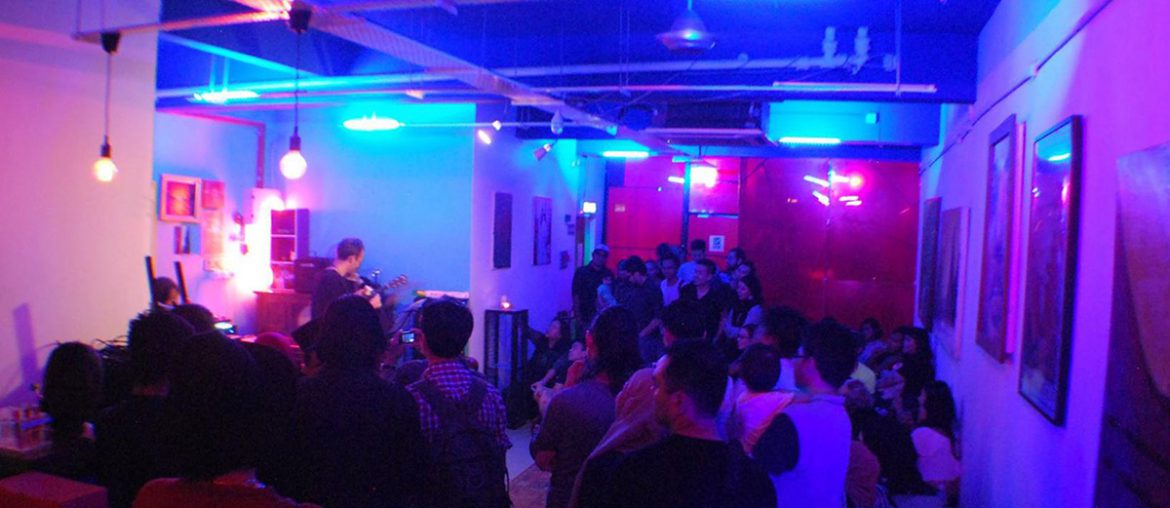By James Rivers. Photos by AxZ and James Rivers.
One thing that almost all music scenes seem to share is the push and pull between those who pine for how things were “back in the day” and those for whom looking forward is the only option, and Kuala Lumpur is no different. While six months definitely isn’t enough to be able to make any definitive statements about how things are generally in Kuala Lumpur, regularly attending shows and being active in the scene—as a musician, engineer and DJ—has given me a chance to hear different perspectives from a broad scope of musicians, organisers, promoters, venue operators, and attendees.
I’ve met a lot of people, some surprisingly young, who show a strong sense of golden age syndrome. They reminisce, usually very vaguely, of a time when music and DIY culture thrived, both in and outside of the punk movement. I’ve heard tales of punk rock shows from back in the day pulling huge crowds, and the bands going on completely unsponsored tours that harnessed the network of musicians, venue operators, organisers and fans present at the time. The cynic in me is forced to mention at this point that those who indulge in this sort of nostalgia usually aren’t very specific with dates; it seems that it’s more about mourning the loss of their youthful motivation rather than the passing of any particular “golden” period.
I’ve also heard mournful tales of the more recent but short lived warehouse rave circuit where irresponsible drug use, leading to a few unfortunate overdoses, quickly stopped it from developing into a sustainable scene. Others still, who made themselves heard through playing on the street, remember the positive transition in public opinion on busking that happened only a handful of years ago. The idea that they were nothing more than beggars with instruments was replaced by an appreciation of the lifestyle, which in turn helped busking become much more sustainable.
Less rose-tinted pessimists often cite the conservative attitudes of important figures and facilitators in the scene (record company management, radio curators, newspaper editors, etc), exemplified by a resistance to musical innovation or anything even remotely eclectic. As an example, a friend, who shall remain nameless, once told me that the record company he works for has even protested his use of seventh and ninth chords in compositions as they were deemed too “jazzy” or experimental. Even in terms of dance music, most club owners or music curators have zero interest in anything removed from the now standardised brands of EDM or, worse, just don’t care for music at all, ignorant of the important role it plays in nightlife and thus their businesses.
It’s not all nostalgia, though and I’ve met people who disregard or even resent such sentimentality. Some are perhaps too young to cling to the past but often it’s those who have spent time studying, working or living abroad who speak most positively of the future. They excitedly tell me of Berlin, Melbourne and London, among other cities. It goes without saying that KL can’t be compared directly to any of those cities, but the important thing for these people isn’t what KL is right now, but what it can be. What’s important for these people is potential. Not just the potential of the musicians and producers here, but also the potential of the arts and culture scene in general.
They cite the plentiful facilities musicians have at their disposal, increasing sponsorship of music events and the melting pot of cultures and influences present here. In addition to the large number of cultures present there is also a strong sense of identity and increasing push from artists to express this identity through all artistic mediums. There also seems to be a growing interest in a more genuine South East Asian culture, an interest that departs from the shallow tourist or backpacker narrative and goes hand in hand with a more modern and less fetishised portrait of South East Asia. The internet has probably played a big role here, providing international marketing platforms that allow local artists to reach far beyond their homeland, on their own terms.
But one of the most crucial things I’ve taken away from all of these conversations is that regardless of which side people stand on, there’s a common hardworking and thoughtful attitude toward music present here. Even the most pessimistic participants I spoke to are still pushing, archiving, printing, playing, recording and promoting. And though they have their gripes, they keep hard at work.
At risk of preaching to the choir, it’s worth pointing out that regardless of whether the glass is half full or half empty to you, the most significant thing you can do for the future of music here in Malaysia is to participate in whichever capacity you can; to attend, compose, perform, document, or curate. People here certainly have something to express, they work hard to refine it, and the better they get the more people will tune in.
—
 After escaping from his native New Zealand, James Rivers arrives at The Wknd as the token mat salleh, bringing with him a paler musical perspective. Being a drummer, producer, DJ, engineer and general music obsessive himself he has a critical but open ear to any style and spends most of his free time hunting down innovative and interesting tunes.
After escaping from his native New Zealand, James Rivers arrives at The Wknd as the token mat salleh, bringing with him a paler musical perspective. Being a drummer, producer, DJ, engineer and general music obsessive himself he has a critical but open ear to any style and spends most of his free time hunting down innovative and interesting tunes.










